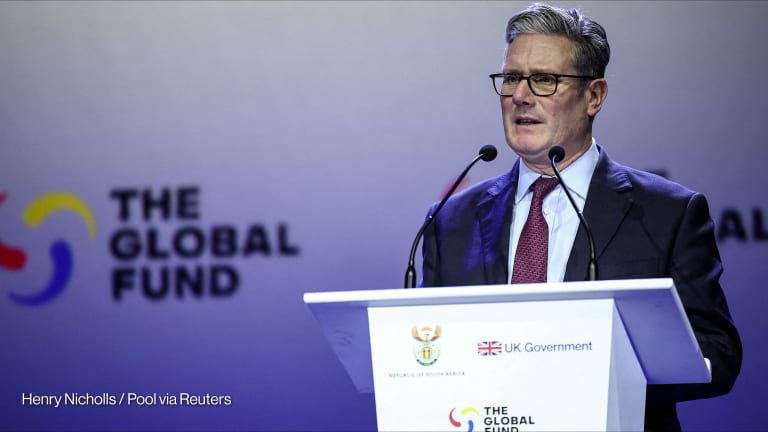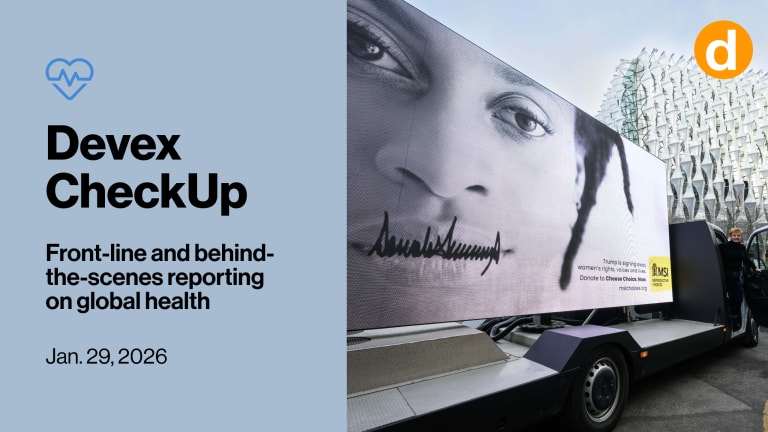
Anti-poverty charity Global Citizen told an Australian tribunal last month that were it not for its advocacy, aid commitments worth billions of dollars would not have been made. But some donors disagree.
Global Citizen’s Australian arm is contesting a decision by the Australian Charities and Not-for-profits Commission to refuse it public benevolent institution status, which would allow the charity to receive tax deductible donations. The Administrative Appeals Tribunal has yet to reach a decision in the case.
However, a virtual hearing from June 15-17 shed light on how Global Citizen sees its advocacy contributing to the United Nations’ 2030 Sustainable Development Goals.
The group — whose global headquarters is in New York, where it is eligible for deductible contributions — claims more than 1.4 million active “Global Citizens.” That’s the average number of users engaging on its website and app each month. Users earn points by taking “actions”: completing a quiz, tweeting or signing a petition on issues such as gender-based violence and hunger. Points allow users to enter contests to win products, such as headphones, or tickets to Global Citizen concerts.
“Since 2009, Global Citizens have taken over 28.4 million actions,” the charity said this month. “Today, these actions, in combination with high-level advocacy work, have led to more than $35.4 billion being distributed to our partners around the world, impacting 1.09 billion lives in the fight to end extreme poverty.”
“The central question is whether the feel-good nature of the Global Citizen approach has been effective at raising and directing funds toward global poverty and health that would not have been available otherwise.”
— Brian Mittendorf, professor, Ohio State UniversityThe ‘but for’ test
Global Citizen considers itself responsible for new donor commitments that are announced on a Global Citizen stage or “driven in a significant way by the actions of Global Citizens, as well as our own high level advocacy efforts, conducted with partners.”
“We have explicit discussions with the partners, and usually the recipient organisation, about the ‘but for’ test as we go,” Simon Moss, a co-founder of Global Citizen and managing director of campaigns, said at the hearing. “That ‘but for’ applies to ‘but for our advocacy, it wouldn't have happened’; or ‘but for us providing an element of something that other partners couldn't get over the line without, they don't believe that it would have happened.’”
However, some donors dispute the charity’s recent statements.
After countries, corporations, and foundations gave a record $8.8 billion at a June 2020 replenishment for Gavi, the Vaccine Alliance, a Global Citizen press release said, “Thanks to the 140,880 Global Citizens who took more than 351,000 actions for the Defeat Disease Together campaign, Australia, Sweden, the Netherlands, France, the United Kingdom, and the European Commission pledged almost 40% of the $8.8 billion total.”
A spokesperson for the Netherlands’ Ministry of Foreign Affairs told Devex in an email that this is incorrect.
“Global Citizens did not have any influence on the [Dutch] contribution itself, nor the height of the contribution,” the spokesperson wrote. “Global Citizens did campaign for the GAVI replenishment, but our contribution was based on internal considerations."
A spokesperson for Sweden’s Ministry for Foreign Affairs wrote that its pledge was based on its assessment of the health partnership’s effectiveness and its previous support.
“In light of the COVID-19 pandemic and the risks of displacement effects on Gavi’s regular activities, Sweden chose to slightly increase its contribution to Gavi, but still maintain the approximate scale of its support relative to other donors,” the Swedish spokesperson wrote. “No external advocacy efforts had a bearing on this decision."
In an email to Devex, a Gavi spokesperson wrote: “Gavi welcomes support of all its advocacy partners. Gavi writes its own investment opportunity, setting out the case for funding, the global ask of all stakeholders, and the impact this will achieve.”
Elsewhere, Global Citizen said that its VAX LIVE concert in May this year “helped mobilize $302 million in funding and over 26 million COVID-19 vaccine doses,” before going on to reference dose-sharing pledges from Norway, Spain, New Zealand, Croatia, and the United Arab Emirates.
“The decision of Spain to facilitate about 22.5 million vaccines by the end of 2021 is fully in line with [the] Vax Live Global Citizen campaign, although Spain’s donations and efforts to ensure equal access to vaccines are not directly depending on it,” a spokesperson from Spain’s Ministry for Foreign Affairs and Cooperation told Devex by email.
A spokesperson for New Zealand’s Ministry of Foreign Affairs and Trade wrote that Global Citizen’s activities had “helped highlight our donations and reinforce the importance of global cooperation in supporting developing countries.”
Pledging conferences have a reputation for sometimes giving donors an opportunity to recycle old pledges. But Global Citizen insists that is not what its fundraising events do.
“There’s often a political tactic of announcing things done in the past, or re-announcing things. We don’t allow any of that,” Global Citizen CEO Hugh Evans said in an interview published in July 2020. “We believe in holding world leaders’ feet to the fire.”
But Devex confirmed in July 2020 that of the €6.15 billion in “additional funding” that Global Citizen and the European Commission said they raised at their Unite for Our Future pledging summit on June 27 that year, €4.9 billion came from European Investment Bank funds — almost all of which were already part of an announcement on April 8.
A Global Citizen representative at communications firm Sunshine Sachs told Devex that as an advocacy organization, Global Citizen “encourages and pushes governments, philanthropists, and corporations to do what they might not initially want to do, which is inherently uncomfortable.”
“As they’ve argued in Australia, governments won’t always be appreciative of such pressure, so it is no surprise that some governments themselves aren’t providing praise, that is not why we do what we do,” the representative added.
‘Hand in hand’
After leading anti-poverty initiatives in Australia in the early 2000s, Evans co-founded the Global Poverty Project — now known as Global Citizen — in 2008, along with Moss and Wei Soo, who has since left the organization. Based in New York since 2010, the charity now has offices in Canada, South Africa, Australia, Germany, the United Kingdom and Nigeria.
Its global board includes leading entertainment and business personalities. Declan Kelly, then-CEO at public relations company Teneo, was dismissed from the Global Citizen board in early May following reports of drunken misconduct, including allegedly touching multiple women inappropriately at the VAX LIVE event.
The group’s upcoming Global Citizen Live broadcast on Sept. 25 aims to “defend the planet and defeat poverty,” with performances worldwide.
VAX LIVE featured U.S. President Joe Biden, French President Emmanuel Macron, Prince Harry, and Meghan, the Duchess of Sussex, plus Foo Fighters, Selena Gomez, and many other artists. A recent issue of Town & Country magazine dubbed Evans “The Man with the Righteous Rolodex.”
With wealthy countries under fire for hoarding vaccines rather than sharing the world’s limited supply with low-income nations, Global Citizen is calling on leaders to do more to ensure vaccine equity. At the same time, those same leaders are celebrating their combined work to date with Global Citizen.
“Together, @GlblCtzn and the @EU_Commission have accomplished so much for universal access to #COVID19 vaccines,” European Commission President Ursula von der Leyen tweeted earlier this month after meeting Evans in person. “We'll continue working hand in hand to end the pandemic everywhere.”
Ahead of May’s Global Health Summit, a European Union official told reporters that consultations with Global Citizen had been “very useful” for the commission in “reaching parts of the population that we normally have certain challenges reaching, which is very important when we support messages like the need to be vaccinated as one of the most effective tools to end this pandemic.”
“We have enjoyed this relationship with Global Citizen, and we think that they have an important voice,” the official added.
Brian Mittendorf, a professor at Ohio State University who specializes in nonprofit financing, said, “The central question is whether the feel-good nature of the Global Citizen approach has been effective at raising and directing funds toward global poverty and health that would not have been available otherwise, or has it instead created a mistaken sense of scale and accomplishment that could breed complacency in the face of dire needs.”
In a recent explainer, Global Citizen outlined how it had spent the last decade “disrupting traditional approaches to pressuring governments, corporate leaders, and philanthropists to make serious commitments towards ending extreme poverty.”
The Global Citizen representative told Devex: “At the core of Global Citizen's mission, the organization wants to make sure that the voices of Global Citizens around the world are heard. That the voices heard in the halls of government aren’t just from corporate lobbyists. This is to help ensure governments, businesses and philanthropists prioritize issues facing the world’s poor and in many cases do what they don’t want to do or aren’t willing to make a priority."
A lawyer for the Australian Charities and Not-for-profits Commission argued that Global Citizen’s advocacy-focused work makes it distinct from organizations that implement development projects themselves.
But counsel for Global Citizen said: “Everything the applicant does, it does in order to relieve poverty. The means by which it does that is securing commitments, massive commitments, together with others, from the government — commitments that an organization standing on the edge of the street rattling a can could never achieve.”
Lisa Cornish and Jessica Abrahams contributed reporting.
Do you know more about this story? Email vince.chadwick@devex.com.









